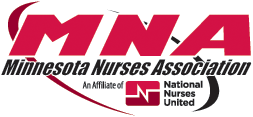(St. Paul) – (January 15, 2016) – Members of the Minnesota Nurses Association call on state lawmakers to implement the recommendations of the Governor’s Health Care Financing Task Force, which appointees passed on Friday. Nurses applaud the task force’s work to move Minnesota closer to ensuring that every patient in the state can access affordable healthcare.
Governor Mark Dayton appointed a board of policy experts and healthcare advocates to the Health Care Financing Task Force in 2015. The task force agreed on a slate of recommendations to send to the legislature, including studying different models of payor systems. The board believes lawmakers should study the costs and benefits of a “Single Payer” or a publicly-financed, privately-delivered universal healthcare model. These options could result in more access, better outcomes, and lower costs for Minnesota’s patients.
“The issues raised within this task force have made it very clear that we must deal with financing the system before we can begin to deal with the care delivery issues,” said MNA Executive Director and Health Care Financing Task Force Member Rose Roach. “We need to move to a place where people get the care they need when they need it, and we save money overall.”
The task force also recommended providing access to health insurance for immigrants, regardless of citizenship status; increasing MinnesotaCare eligibility to 275 percent of the federal poverty line; and extending the much-needed provider tax to fund critical state programs that pay for prevention and treatment.
“As nurses, we see patients who waited too long to get care, and now their conditions are more severe,” said Mary C. Turner, MNA President. “The health of the patient impacts the health of the community. When patients can get the care they need, it saves their families money.It saves businesses money, and it helps the state budget too,” Turner said.
Nurses have been advocating for Single Payer for years, and they are happy to see the state considering a system that covers every Minnesota resident while still allowing them to see their doctor.
“It’s simple, everybody in, nobody out,” Roach said. “One big pool, no more segregating and fragmenting us based on income, geography, employment or citizenship status, age, or gender.”

